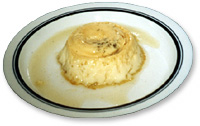
Effects of gentle versus high heat on egg proteins Prepare a baked custard mixture, pour it into individual serving dishes, and place all except one in a shallow pan with hot water halfway up the sides of the custard cups. Place the remaining custard on the oven rack beside the water bath, and bake all the custards the same length of time. If you peek in the oven when the custards are almost cooked, that poor lone custard will probably be boiling! Compare this custard to one cooked in the water bath. When they're cooled, turn each onto a plate and examine it carefully. Chances are the custard without the benefit of the water bath is full of little holes and oozing liquid. Taste it and you'll find the texture is quite rubbery. That's because the egg proteins have coagulated, then toughened, squeezing out liquid as they're exposed to prolongued heat. The same phenomenon occurs when an egg is cooked in a sizzling frying pan. The white gets tough and rubbery and has little holes throughout where water has leaked from the coagulating white. Even for frying eggs, gentle heat is preferable.
—Anne Gardiner and Sue Wilson, The Inquisitive Cook
|
||||
